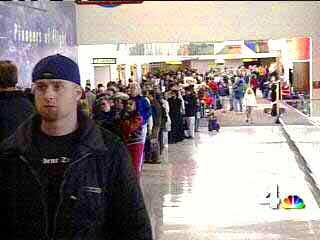Fri, Sep 10, 2004
Test Checks Passenger Documents for Explosives at Reagan
National Airport
 The TSA says it's launching a pilot
program at four airports in which passenger documents such as
boarding passes or state driver’s licenses will be scanned
for traces of explosives.
The TSA says it's launching a pilot
program at four airports in which passenger documents such as
boarding passes or state driver’s licenses will be scanned
for traces of explosives.
The pilot, which begins this week at Ronald Reagan Washington
National Airport (DCA), uses an Explosives Trace Detection Document
Scanner, the same technology recently proved effective in
TSA’s Transit Rail Inspection Pilot Project in
Connecticut.
"By leveraging results of last month’s tests in the rail
environment, TSA utilizes proven explosives detection technologies
to safeguard the traveling public in another mode of
transportation," said Rear Admiral David M. Stone, USN (Ret.),
Assistant Secretary of Homeland Security for TSA. "This test and
others studying new trace explosives detection tools, passenger
identification, and air cargo screening, illustrate TSA’s
commitment to improving security in all modes by utilizing the
latest emerging technologies."
DCA is the first airport to conduct an operational test of the
new equipment. The tests will be launched next week at Los Angeles
International Airport, and at New York’s John F. Kennedy
International Airport and Chicago’s O’Hare
International Airport by the end of the month.
The Document Scanner analyzes samples collected by swiping the
surface of a document over a collection disc and alerts the
screener if explosive residue is detected. During the pilot, only
passengers set aside for secondary screening at Terminal B’s
South Pier checkpoint will have their boarding passes scanned. If
the Document Scanner alarms, the screener will implement additional
screening procedures.

The TSA says this is one in a series of next generation tools
being tested. They include explosive trace detection portals, which
are being tested in four airports with nearly a dozen more to come
online in the next year. The Registered Traveler Pilot Program, in
place at five airports, is another innovative instrument to improve
security through identity verification. Finally, in the air cargo
arena, a six-airport test is using bulk Explosives Detection
Systems (EDS) machines to screen non-containerized cargo.
More News
From 2023 (YouTube Edition): "Ain’t Your Daddy’s Super Cub”—Don Wade Co-owned by Don and Ron Wade—the former of Don’s Dream Machines, a storied >[...]
Pilot-Rated Passenger Reported That The Pilot Did Not Adequately “Round Out” The Landing Flare And The Airplane Bounced And Yawed To The Right Analysis: The pilot state>[...]
Dead Reckoning Dead reckoning, as applied to flying, is the navigation of an airplane solely by means of computations based on airspeed, course, heading, wind direction, and speed,>[...]
Aero Linx: Lake Amphibian Club This website is created and sponsored by the Lake Amphibian Club, to help spread the word about these wonderful, versatile amphibians that can land j>[...]
“I am deeply honored to be sworn in as NASA administrator. NASA’s mission is as imperative and urgent as ever — to push the boundaries of human exploration, ignit>[...]
 Classic Aero-TV: In Praise of Alabamas Patriot Aircraft USA
Classic Aero-TV: In Praise of Alabamas Patriot Aircraft USA NTSB Final Report: Cirrus Design Corp SR22
NTSB Final Report: Cirrus Design Corp SR22 ANN's Daily Aero-Term (12.21.25): Dead Reckoning
ANN's Daily Aero-Term (12.21.25): Dead Reckoning ANN's Daily Aero-Linx (12.21.25)
ANN's Daily Aero-Linx (12.21.25) Aero-News: Quote of the Day (12.21.25)
Aero-News: Quote of the Day (12.21.25)




